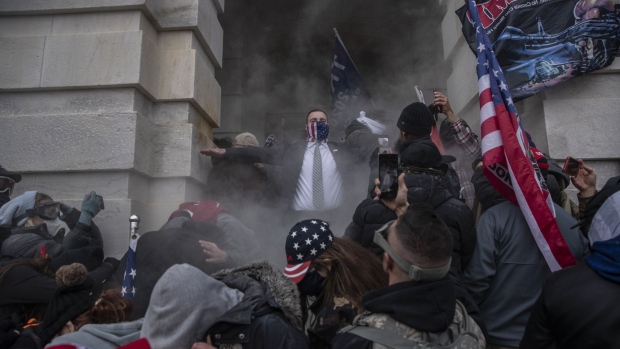Dec 21, 2021
Capitol Rioters Win Permission to Spend Christmas With Family
, Bloomberg News

(Bloomberg) -- Some of the people confined to their homes while awaiting trial on charges tied to the riot at the U.S. Capitol are getting court permission to travel during the holidays.
While it’s been almost a year since a mob tried to forcibly prevent Congress from certifying President Joe Biden’s election victory, hundreds of defendants still haven’t been tried, and judges have been temporarily loosening some restrictions on their movement.
Thomas Caldwell, a Virginia man who is charged in one of the biggest conspiracy cases stemming from the riot and who bought a gun that looked like a cell phone weeks before the attack, asked to attend a party with his neighbors on Christmas. U.S. District Judge Amit P. Mehta in Washington on Monday granted the request, which prosecutors didn’t challenge.
Donovan Crowl, a former Marine who stormed the Capitol with the right-wing Oath Keepers militia group while wearing a combat helmet and ballistic goggles, asked to spend Christmas and New Year’s with his sister. Christopher Grider, a Texas wine-maker who allegedly helped shatter a window leading to the House chamber, asked to leave his multi-acre property in central Texas to visit family in Houston and Dallas this week. Both requests were granted.
In Grider’s case, prosecutors had tried in January to keep him locked up by arguing that the father of three was “at the front line, breaching a secure location with violence after disrupting Congress.” Even so, the U.S. didn’t object to his recent holiday plans.
The treatment of many of the 700 people charged so far with crimes stemming from the Capitol siege has been criticized by some as too lenient for people who allegedly attempted to forcibly overthrow an election. Prosecutors had a hard time keeping many of them behind bars pending trial, with judges instead granting home confinement with GPS monitoring.
‘Ho-Hum Crimes’
Jennifer Rodgers, a former federal prosecutor in Manhattan who has been closely watching the Jan. 6 cases, said the treatment of many of the defendants sends the message “that these are ho-hum crimes.”
“How many people in U.S. jails and prisons -- disproportionately men of color, and some for low-level non-violent offenses -- enjoy Christmas at home?” said Rodgers, now a lecturer at Columbia Law School. “To state the question is to answer it: It doesn’t happen.”
Many defendants who are confined to their homes are already allowed to leave their property for work, church services or medical appointments. And many don’t need to request to leave for the holidays because they’re already locked up with their families. But not all of them.
Adam Johnson, who was photographed smiling in the Capitol while walking away with the Speaker of the House’s lectern, wants to visit his father on Christmas Eve in Miami. U.S. District Judge Reggie B. Walton granted that request on Dec. 13.
George Pierre Tanios, charged in March with assaulting a U.S. Capitol Police officer, filed an unopposed motion to modify his home confinement to travel from West Virginia to New Jersey to visit family for Christmas.
“His sister is about to have a baby any day now, and he would like to be able to meet his new niece/nephew during the holiday get together for his family,” his lawyer said in the filing.
The request was granted by U.S. District Judge Thomas Hogan at a hearing on Dec. 10.
©2021 Bloomberg L.P.







